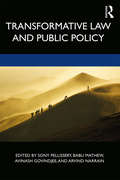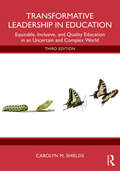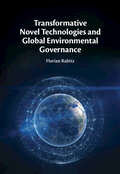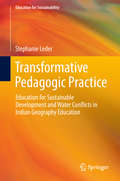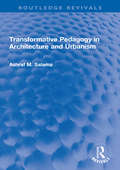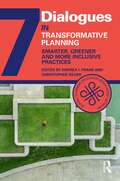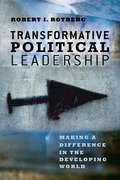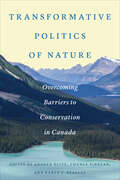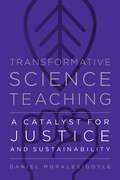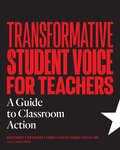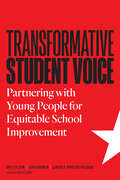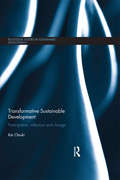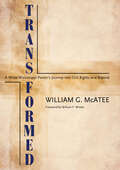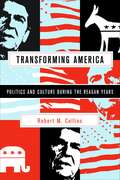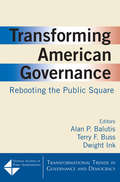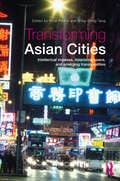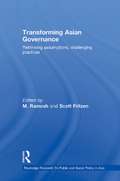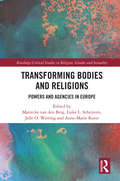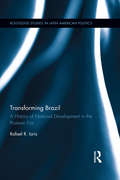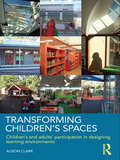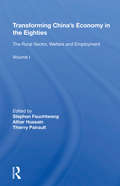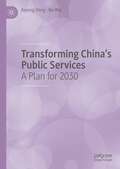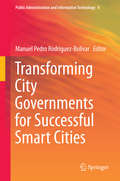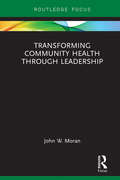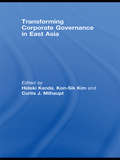- Table View
- List View
Transformative Law and Public Policy
by Sony Pellissery Babu Mathew Avinash Govindjee Arvind NarrainThis book explores the convergence of law and public policy. Drawing on case studies from Asia, Europe, the Middle East and Australia, it examines how judicial and political institutions are closely linked to the socio-economic concerns of the citizens. The essays argue for the utilization of both legislative and executive, private and public spheres of society as vehicles for transformative social change and to safeguard against violations of socio-economic rights. The volume will be of great interest to both public and private stakeholders, as well as professionals, including NGOs and think tanks, working in the areas of law, government, and public policy. It will also be immensely useful to academics and researchers of constitutionalism, policymaking and policy integration, social justice and minority rights.
Transformative Leadership in Education: Equitable, Inclusive, and Quality Education in an Uncertain and Complex World
by Carolyn M. ShieldsFramed by real stories and grounded in research, the third edition of Transformative Leadership in Education presents an alternative approach to leadership that is engaged, active, and courageous. Noted scholar Carolyn M. Shields once again explores the concept of transformative leadership theory and its potential to create learning environments that are inclusive, excellent, equitable, and socially just, as required by the United Nations Sustainable Development Goal 4, even in the face of the volatile, uncertain, complex, and ambiguous world of education today. Chapters combine contemporary research findings with stories of schools, leaders, students, teachers, and community members to demonstrate that transformative leadership can promote academic achievement, family and community empowerment, democratic engagement, and global citizenship. This exciting text will appeal to all aspiring and practicing leaders who want to create organizations that are equitable, inclusive, and excellent and that prepare students to be successful, caring, and engaged citizens of the global community.New in this edition: Discussion of the United Nations Sustainable Development Goal 4: “to ensure inclusive, equitable and quality education and lifelong learning for all.” Updated end-of-chapter guiding questions to help readers reflect on their own practice and to apply the concepts in their own contexts. Enriched discussion of the interrelationships among the eight tenets of transformative leadership and leading for social justice, with a separate chapter for each tenet. Elaborated discussion of the need for reflection, grounding, and action on the part of transformative leaders. Updated and expanded discussion of current topics such as refugees, transgender students, and historical roots of concepts like Islamophobia and anti-Semitism. A survey to identify leadership beliefs and actions about equity and inclusion. Support Materials to prompt further dialogue and reflection downloadable at www.routledge.com/9781032734002.
Transformative Novel Technologies and Global Environmental Governance
by Florian RabitzTransformative Novel Technologies are potential gamechangers for confronting climate change, biodiversity loss, and many other elements of the global environmental crisis, allowing us to achieve a more sustainable future. The contemporary and future international governance of these technologies has crucial implications for managing the global transition towards sustainability. This book is the first to present a comprehensive assessment of the impact of these technologies on international politics. The author examines the responses of international institutions to the emergence of these technologies, focusing on three broad domains: biotechnology, climate engineering, and mineral extraction in areas beyond national jurisdiction (the ocean floor or near-Earth asteroids). This book is aimed at a non-specialist, academic audience with interest in the international and environmental politics of sustainability and technology. This title is part of the Flip it Open Programme and may also be available Open Access. Check our website - Cambridge Core - for details.
Transformative Pedagogic Practice: Education for Sustainable Development and Water Conflicts in Indian Geography Education (Education for Sustainability)
by Stephanie LederThis book explores how the transnational Education for Sustainable Development (ESD) policy is being translated into formal school education in India. Stephanie Leder investigates the ESD’s transformative potential for pedagogic practice and builds a set of principles for how the global objectives of the ESD can be interpreted in diverse socio-cultural contexts. Her approach for transformative pedagogic practice emphasizes the promotion of a critical consciousness through argumentation skills. Using the case of water conflicts in geography education in India, the book reveals the contradictions between ESD objectives and curricula, syllabi, textbooks and classroom teaching at secondary schools in Pune, Maharashtra. Leder’s approach demonstrates how principles of schooling can be altered towards learner-centered, problem-posing and network-thinking teaching approaches to empower students towards reflective decision-making on the sustainable use of natural resources.
Transformative Pedagogy in Architecture and Urbanism (Routledge Revivals)
by Ashraf M. SalamaFirst published in 2009, Transformative Pedagogy in Architecture and Urbanism is a detailed round of pedagogical dialogue on architecture and urbanism that reset the stage for debating future visions of transformative pedagogy and its impact on design education. Structured in five chapters the book presents a wide range of innovative concepts and practical methodologies for teaching architectural and urban design. It traces the roots of architectural education and offers several contrasting ideas and strategies of design teaching practices. Transformative Pedagogy in Architecture and Urbanism will appeal to those with an interest in architectural and urban design, and architectural and design education.
Transformative Planning: Smarter, Greener and More Inclusive Practices
by Andrea I. FrankThe Dialogues in Urban and Regional Planning series offers a selection of some of the best scholarship in urban and regional planning from around the world with internationally recognized authors taking up urgent and salient issues from theory, to education for and practice of planning. This 7th volume features contributions on the theme of Transformative Planning: Smarter, Greener and More Inclusive Practices. It includes chapters from leading planning scholars and practitioners who critically examine how transformative planning practices seek to reduce inequalities, promote sustained, inclusive and sustainable economic growth, achieve gender equality, improve human health and well-being, foster resilience of urban communities and protect the environment and thereby change urban planning paradigms. Several case studies of emerging transformative planning interventions illustrate practical ways forward. Transformative Planning offers provocative insights into the global planning community’s struggle and contribution to tackle the major challenges to society in the 21st century. It will be of use for advanced undergraduate and graduate courses in the wide-ranging fields encompassed by urban studies, sustainability studies, and urban and regional planning. The Dialogues in Urban and Regional Planning (DURP) series is published in association with the Global Planning Education Association Network (GPEAN) and its member national and transnational planning schools associations.
Transformative Political Leadership: Making a Difference in the Developing World
by Rotberg Robert I.Accomplished political leaders have a clear strategy for turning political visions into reality. Through well-honed analytical, political, and emotional intelligence, leaders chart paths to promising futures that include economic growth, material prosperity, and human well-being. Alas, such leaders are rare in the developing world, where often institutions are weak and greed and corruption strong--and where responsible leadership therefore has the potential to effect the greatest change. In Transformative Political Leadership, Robert I. Rotberg focuses on the role of leadership in politics and argues that accomplished leaders demonstrate a particular set of skills. Through illustrative case studies of leaders who have performed ably in the developing world--among them Nelson Mandela in South Africa, Seretse Khama in Botswana, Lee Kuan Yew in Singapore, and Kemal Ataturk in Turkey--Rotberg examines how these leaders transformed their respective countries. The importance of capable leadership is woefully understudied in political science, and this book will be an important tool in exploring how leaders lead and how nations and institutions are built.
Transformative Politics of Nature: Overcoming Barriers to Conservation in Canada
by Andrea Olive Chance Finegan Karen F. BeazleyTransformative Politics of Nature highlights the most significant barriers to conservation in Canada and discusses strategies to confront and overcome them. Featuring contributions from academics as well as practitioners, the volume brings together the perspectives of both Indigenous and non-Indigenous experts on land and wildlife conservation, in a way that honours and respects all peoples and nature. Contributors provide insights that enhance understanding of key barriers, important actors, and strategies for shaping policy at multiple levels of government across Canada. The chapters engage academics, environmental conservation organizations, and Indigenous communities in dialogues and explorations of the politics of wildlife conservation. They address broad and interrelated themes, organized into three parts: barriers to conservation, transformation through reconciliation, and transformation through policy and governance. Taken together, the essays demonstrate the need for increased social-political awareness of biodiversity and conservation in Canada, enhanced wildlife conservation collaborative networks, and increased scholarly attention to the principles, policies, and practices of maintaining and restoring nature for the benefit of all peoples, species, and ecologies. Transformative Politics of Nature presents a vision of profound change in the way humans relate to each other and with the natural world.
Transformative Science Teaching: A Catalyst for Justice and Sustainability
by Daniel Morales-DoyleA call to action championing equity and social justice in K–12 science curriculum
Transformative Student Voice for Teachers: A Guide to Classroom Action
by Ben Kirshner Shelley Zion Carlos P Hipolito-Delgado Dane StickneyA step-by-step guidebook for teachers on how to build a classroom community that empowers students through critical reflection, inquiry, and action to drive school transformation
Transformative Student Voice: Partnering with Young People for Equitable School Improvement
by Ben Kirshner Shelley Zion Carlos P Hipolito-DelgadoA testament to the power of centering youth voices in planning and implementing school reform
Transformative Sustainable Development: Participation, reflection and change (Routledge Studies in Sustainable Development)
by Kei OtsukiRecent debates about sustainable development have shifted their focus from fixing environmental problems in a technocratic and economic way to more fundamental changes in social-political processes and relations. In this context, participation is a genuinely transformative approach to sustainable development, yet the process by which participation leads to transformation is not sufficiently understood. This book considers how the act of participating in sustainable development projects can bring about social transformation that is considered to be fair and just by the participants and non-participants in a broader societal context. Drawing on ideas from social theory and applied anthropology, the book proposes a reflexivity-based framework to analyse participation as a type of social action underpinned by primary experience. Development projects have a transformative effect when participants are given the opportunity to reflect on their experience, share the reflection with others, and open new space for collective deliberation and change. The book applies this framework to assess community-based participatory projects in the Amazon, African slums and rural settlements, and disaster stricken areas in Japan. It also outlines potential institutions of governance to institutionalize the change by referring to current food governance, drawing out lessons with international relevance. This book will be of interest to students of sustainable development, environmental policy and development studies, as well as practitioners and policy-makers in these fields.
Transformed: A White Mississippi Pastor’s Journey into Civil Rights and Beyond (Willie Morris Books in Memoir and Biography)
by William G. McateeIn May 1964, Bill McAtee became the new minister at Columbia Presbyterian Church, deep in the Piney Woods of south Mississippi. Soon after his arrival, three young civil rights workers were brutally murdered outside Philadelphia, Mississippi. Many other activists from across the country poured into the state to try to bring an end to segregation and to register Black citizens to vote. Already deeply troubled by the resistance of so many of his fellow white southerners to any change in the racial status quo, McAtee understood that he could no longer be a passive bystander. A fourth-generation Mississippian and son of a Presbyterian minister, he joined a group of local ministers—two white and four Black—to assist the mayor of Columbia, Earl D. “Buddy” McLean, in building community bridges and navigating the roiling social and political waters. Focusing on the quiet leadership of Mayor McLean and fellow ministers, McAtee shows how these religious and political leaders enacted changes that began opening access to public institutions and facilities for all citizens, Black and white. In retrospect, McAtee’s involvement in these events during this intense period became a turning point in repudiating his past acquiescence to the injustices of the racist society of his birth. His personal account of this transformation underscores its meaning for him today and reminds the reader that no generation can ignore the past or rest comfortably on its progress toward tolerance, equality, and justice.
Transforming America: Politics and Culture During the Reagan Years
by Robert M. CollinsBy the end of the 1980s, the "malaise" that had once pervaded American society was replaced by a renewed sense of confidence and national purpose. However, beneath this veneer of optimism was a nation confronting the effects of massive federal deficits, a reckless foreign policy, AIDS, homelessness, and a growing "cultural war." In Transforming America, renowned historian Robert Collins examines the decade's critical and controversial developments and the unmistakable influence of Ronald Reagan. Moving beyond conventional depictions that either demonize or sanctify Reagan, Collins offers fresh insights into his thought and influence. He portrays Reagan as a complex political figure who combined ideological conservatism with political pragmatism to achieve many of his policy aims. Collins demonstrates how Reagan's policies helped to limit the scope of government, control inflation, reduce the threat of nuclear war, and defeat communism. Collins also shows how the simultaneous ascendancy of the right in politics and the left in culture created a divisive legacy. The 1980s witnessed other changes, including the advent of the personal computer, a revolution in information technology, a more globalized national economy, and a restructuring of the American corporation. In the realm of culture, the creation of MTV, the popularity of self-help gurus, and the rise of postmodernism in American universities were the realization of the cultural shifts of the postwar era. These developments, Collins suggests, created a conflict in American society that continues today, pitting cultural conservatism against a secular and multicultural view of the world.Entertaining and erudite, Transforming America explores the events, movements, and ideas that defined a turbulent decade and profoundly changed the shape and direction of American culture and politics.
Transforming American Governance: Rebooting the Public Square (Transformational Trends In Governance And Democracy Ser.)
by Alan P. Balutis Dwight InkGovernment and governance will be very different in the future than anticipated by the literature in the field.
Transforming Asian Cities: Intellectual impasse, Asianizing space, and emerging translocalities
by Nihal Perera Wing-Shing TangWhile there is no lack of studies on Asian cities, the majority focus on financial districts, poverty, the slum, tradition, tourism, and pollution, and use the modern, affluent, and transforming Western city as the reference point. This vast Asian empirical presence is not complemented by a theoretical presence; academic discourses overlook common and basic urban processes, particularly the production of space, place, and identity by ordinary citizens. Switching the vantage point to Asian cities and citizens, Transforming Asian Cities draws attention to how Asians produce their contemporary urban practices, identities, and spaces as part of resisting, responding to, and avoiding larger global and national processes. Instead of viewing Asian cities in opposition to the Western city and using it as the norm, this book instead opts to provincialize mainstream and traditional knowledge. It argues that the vast terrain of ordinary actors and spaces which are currently left out should be reflected in academic debates and policy decisions, and the local thinking processes that constitute these spaces need to be acknowledged, enabled, and critiqued. The individual chapters illustrate that "global" spaces are more (trans)local, traditional environments are more modern, and Asian spaces are better defined than acknowledged. The aim is to develop room for understandings of Asian cities from Asian standpoints, especially acknowledging how Asians observe, interpret, understand, and create space in their cities.
Transforming Asian Governance: Rethinking assumptions, challenging practices (Routledge Research On Public and Social Policy in Asia)
by M. Ramesh Scott FritzenThere are a multitude of hazards that confront attempts to change institutional or political orders in pursuit of good governance. Even seemingly technical prescriptions run up against local political and social realities which make their adoption difficult and, if adopted, require significant modification of the original prescriptions. Moreover, the technical, rationalist and/or normative language employed in the good governance discourse masks contests over power, rights, resources, and actors’ conflicting interests. There is a definite need to situate the good governance debate in the local context rather than reflexively adopting a universalistic positing of the fact or desirability of governance convergence across countries and sectors because the reality is that the world-wide deployment of good governance rhetoric is not accompanied by convergence in thinking or practices across nations. Transforming Asian Governance asks: • How do good governance principles translate into local settings?• How do local settings influence the conception of what is good governance and how the debate over good governance is deployed as a political or administrative strategy? Using case studies in governance from Thailand, the Philippines, Pakistan, Malaysia, India, Indonesia, Korea and Japan, this book will be essential reading for anyone interested in the public and social policy of Asia, and international and comparative governance more generally.
Transforming Bodies and Religions: Powers and Agencies in Europe (Routledge Critical Studies in Religion, Gender and Sexuality)
by Mariecke Van Den Berg Lieke Schrijvers Jelle Wiering Anne-Marie KorteThis book sheds an interdisciplinary light on ‘transforming bodies’: bodies that have been subjected to, contributed to, or have resisted social transformations within religious or secular contexts in contemporary Europe. It explores the intersections of race, ethnicity, gender, sexuality and religion that underpin embodied transformations. Using post-secularist, postcolonial and gender/queer perspectives, it aims to gain a better understanding of the orchestrations and effects of larger social transitions related to religion. This volume is the outcome of the intensive collaboration of the authors, who for years have been meeting regularly in Utrecht, the Netherlands, to discuss themes related to religion and ‘the challenge of difference’, with an added afterword by Prof. Pamela Klassen from the University of Toronto. The book is divided in three subsections that focus on particular types of embodiment: body politics in governmental and NGO organisations; the role of the body in literary and/or autobiographical narratives; and ethnographic case studies of bodies in daily life. Doing so, it provides an innovative exploration of contemporary religion and the body. It will, therefore, be of great interest to scholars of Religious Studies, Gender and Sexuality Studies, Post-Colonial Studies, Anthropology, Sociology, Theology, and Philosophy.
Transforming Brazil: A History of National Development in the Postwar Era (Routledge Studies in Latin American Politics)
by Rafael R. IorisIn this book, Rafael R. Ioris critically revisits the postwar context in Brazil to reexamine traditional questions and notions pertaining to the nature of Latin America’s political culture and institutions. It was in this period that the region lived some of its most intense and successful experiences of fast economic growth, which was paradoxically marred by heightened ideological divisions, political disruptions, and the emergence of widespread authoritarian rule. Combining original sources of political, diplomatic, intellectual, cultural, and labor histories, Ioris provides a comprehensive history of the fruitful debates concerning national development in postwar Brazil, a time when the so-called country of the future faced one of its best moments for consolidating political democracy and economic prosperity. He argues that traditional views on political instability have been excessively grounded on an institutional focus, which should be replaced by in-depth analysis of events on the ground. In so doing, he reveals that as national development meant very different things to multiple different social segments of the Brazilian society, no unified support could have been provided to the democratically elected political regime when things rapidly became socially and politically divisive early in the 1960s. Innovating in its multidimensional analytical scope and interdisciplinary focus, Transforming Brazil provides a rich political, cultural, and intellectual examination of a historical period characterized by rapid socio-economic changes amidst significant political instability and the heightened ideological polarization shaping the political scenario of Brazil and much of Latin America in the Cold War era.
Transforming Children's Spaces: Children's and Adults' Participation in Designing Learning Environments
by Alison ClarkHow can young children play an active role in developing the design of learning environments? What methods can be used to bring together children’s and practitioners’ views about their environment? What insights can young children offer into good designs for these children’s spaces? With the expansion of early childhood education and the move to 'extended schools', more young children will spend more time than ever before in institutions. Based on two actual building projects, this book is the first of its kind to demonstrate the possibilities of including young children’s perspectives in the design and review of children’s spaces. Situated at the heart of the debate about the relationship between the built environment and its impact on children’s learning and wellbeing, Transforming Children’s Spaces provides insights into how young children see their environment discusses children’s aspirations for future spaces develops the 'Mosaic approach' , pioneered by the author, as a method for listening to young children and adults Emphasising the importance of visual and verbal methods of communication, this fascinating book demonstrates how practitioners and young children can articulate their perspectives, and shows how participatory methods can support new relationships between children, practitioners and architects. This book is essential reading for those who work in children's spaces and for those who design them as well as being of general interest to those studying education and childhood studies.
Transforming China's Economy In The Eighties: Vol. 1: The Rural Sector, Welfare And Employment
by Stephen FeuchtwangThis is the first of two volumes on the transformation of China since 1978. The second volume concentrates on the government administration of the reforms which have brought changes in economic organization; it deals with the urban economy. The focus of this volume is on changes in the rural economy, provision for basic needs such as nutrition and
Transforming China's Public Services: A Plan for 2030
by Keyong Dong Na WeiThis book explores the developmental direction of the modernization of China's basic public services in the context of national governance modernization. Describing the blueprint for the modernization of China's basic public services in 2030, including basic public education, basic medical and health services, basic old-age services, and basic public cultural services, this book reflects Chinese public management scholars' strategies for the modernization of China’s public services in the next 10 years and the path to get there. This book will interest scholars of Chinese governance, as well as readers who want to understand the current status, challenges and development strategies of China's public service and social policy fields.
Transforming City Governments for Successful Smart Cities
by Manuel Pedro Rodríguez-BolívarThere has been much attention paid to the idea of Smart Cities as researchers have sought to define and characterize the main aspects of the concept, including the role of creative industries in urban growth, the importance of social capital in urban development, and the role of urban sustainability. This book develops a critical view of the Smart City concept, the incentives and role of governments in promoting the development of Smart Cities and the analysis of experiences of e-government projects addressed to enhance Smart Cities. This book further analyzes the perceptions of stakeholders, such as public managers or politicians, regarding the incentives and role of governments in Smart Cities and the critical analysis of e-government projects to promote Smart Cities' development, making the book valuable to academics, researchers, policy-makers, public managers, international organizations and technical experts in understanding the role of government to enhance Smart Cities' projects.
Transforming Community Health through Leadership
by John W. MoranAs the United States faces increasingly difficult and trenchant public health problems, from the Zika virus to the obesity epidemic to the opioid crisis, population health is a growing area of concern for public health organizations, particularly how to care for populations effectively on a shoestring budget. Though little discussed in the mainstream media, community health improvement organizations are increasingly partnering and forming coalitions with local hospitals, working together to improve traditional medical care. But with the pace of change in health care policy, these coalitions must be thoughtfully lead and managed. This new book from John W. Moran, Senior Quality Advisor to the Public Health Foundation, demonstrates how to build, operate, manage, and sustain a community health improvement coalition once it is formed. Offering the reader practical examples and guidance on forming and sustaining a community health coalition, this book demonstrates the ways in which the success of a coalition depends upon a stable anchor organization and a committed leader. Chapters focus on each of these roles and how to achieve success in each: examining what needs improvement, why it is important to improve now, how it will be done, and where in the community improvement can have the most impact. The last chapter offers a case study exploring a community health coalition and leader to illustrate application of the concepts introduced throughout the book. Transforming Community Health through Leadership is designed specifically to prepare governmental public health, health care, and community leaders to take advantage of the ever-changing landscape of public health and health care in concrete ways to improve population health.
Transforming Corporate Governance in East Asia
by Hideki Kanda Kon-Sik Kim Curtis MilhauptOver the past ten years, the corporate governance environment in East Asia has undergone a significant transformation. The Asian Financial crisis, together with Japan‘s long economic malaise, undermined confidence in the corporate structures, governance practices, and regulatory oversight of firms in the region. Since that time, each of the countri
